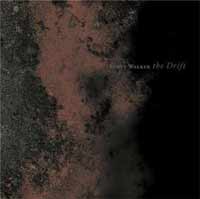Scott Walker, "The Drift"
 I would like to claim that the central rift of opinion on the solo career of Scott Walker falls between those who think that the aging crooner's music has become ridiculously pretentious, and those who think he's a genius. Actually, though, this would be inaccurate, as even those who love Scott Walker and think him a genius are also likely to find him pretentious. The only difference between admirers and detractors is that admirers can look past Walker's many pretensions, and the detractors either refuse to or can't.
I would like to claim that the central rift of opinion on the solo career of Scott Walker falls between those who think that the aging crooner's music has become ridiculously pretentious, and those who think he's a genius. Actually, though, this would be inaccurate, as even those who love Scott Walker and think him a genius are also likely to find him pretentious. The only difference between admirers and detractors is that admirers can look past Walker's many pretensions, and the detractors either refuse to or can't.
This reception is not likely to change with the release of The Drift on 4AD, the long-awaited follow up to Scott Walker's previous solo effort, 1995's Tilt, a masterpiece of utterly unclassifiable and counterintuitive songwriting; the over-emoting existentialist MOR lounge pop of Walker's late-'60s output abstracted and stretched into a brutal suite of operatic and disturbing ambient sound sculptures. The Drift clearly demonstrates that Walker isn't planning on retreating into familiar territory anytime soon; no Jacques Brel covers or maudlin reflections on Bergman films to be found here. Instead, Walker presents nine songs, each more hallucinatory, skeletal and cryptic than the last, each articulating a different trauma, fearlessly collapsing the line that usually divides personal anguish and public catharsis. Walker's painfully enunciated vocals tackle traumas as diverse as 9/11, the evils of mass culture, the Slobodan Milosevic regime and the execution of Mussolini, but in uneasy ways that don't let listeners off the hook, not even for a second. There is a sense in which living through the six-and-a-half minutes of Walker's 9/11 meditation "Jesse" more than once could be thought of as a more traumatic experience than living through the terrorist attacks themselves.
Walker's vocals are just as arch and constipated as they have always been, dripping slow like moldy treacle through the crepuscular recesses of each song's tortuous anatomy. Apologies to those who think that Walker's voice is beautiful, expressive and operatic; on the contrary, I have always likened Walker's voice to that of Arcesia, the acid-damaged big-band leader who recorded the harrowing and hilarious 1968 LP Reachin'. Walker's painfully affected vocals invite derision, especially the older and more willfully obscure he gets. Like them or hate them, you've got to admit that no one else's voice would work nearly as well on a Scott Walker album. When he breaks into a malevolent impression of Donald Duck on "The Escape," all one can do is admire the artist's fearless audacity.
Similarly, Walker's lyrics are just as esoteric and purposely befuddling as they've always been. Advance press for the album revealed that many of the lyrical couplets in the album's opening track "Cossacks Are" were stolen from snatches of news articles and TV soundbites, and that "Jesse" is a dream-condensation combining anecdotes about Elvis' deceased twin brother Jesse with the attack on the twin towers. It would be useless for me to comment on whether or not these poetic conceits are successful, since their "meaning" has only been gleaned from secondary sources. Suffice it to say that I think Walker's lyrics are precisely as powerful as they are opaque; their opacity serves to abstract the signifying function of language from Walker's text, leaving only the tactile, gestural countours of each painfully emoted phoneme in place of meaning. This is confirmed in "A Lover Loves," when Walker subverts what has the potential to be the most lovely and melodic track on the album by simply blowing and hissing into the microphone.
Though one may occasionally encounter a lush orchestral swell or a long passage retaining basic melodic progression and rhythmic sense, the overwhelming shape of the album remains structure-less and palpitating, shifting blocks of sound aghast at finding themselves in one another's presence. Much has been made of the percussive use of raw slabs of bacon on "Clara," but in contrast to the object-sampling strategies of a group like Matmos, Walker is only interested in the potential of objects to produce jarring, industrial noise that will dissolve the borders of the listener's comfort zone. Sprinklings of acoustic guitar, smatterings of electronic chatter, subtle tonal irritations and hypnotic undercurrents of subaquatic drone are all utilized by Walker for essentially the same multi-pronged purpose: to background and foreground the drama of his anguished utterances; to undermine the listener's expectations, bringing them dangerously close to that frightening realm of painfully exhilarating enjoyment, the traumatic core of the real place before language. Antonin Artaud would have approved.
samples:



